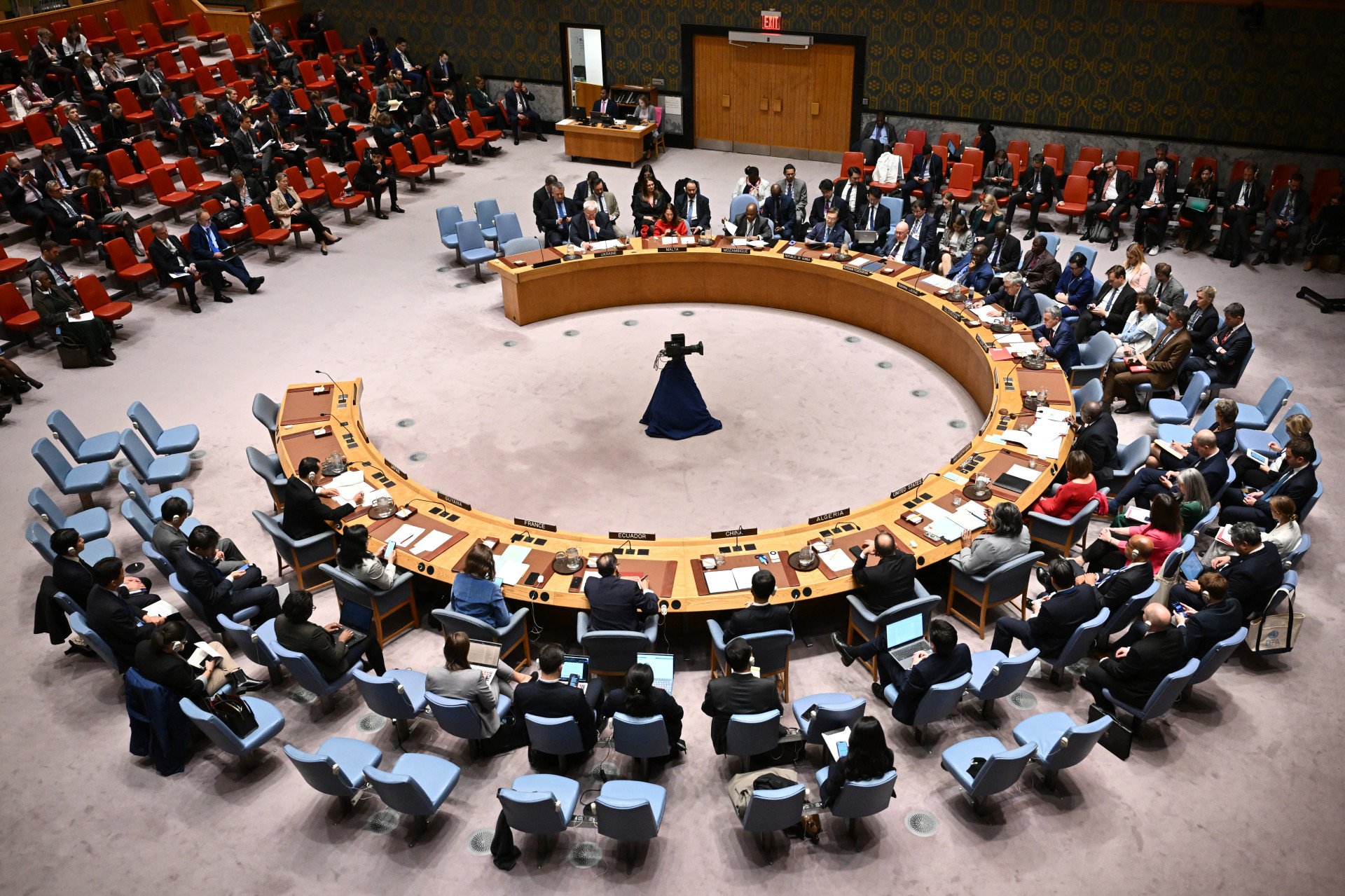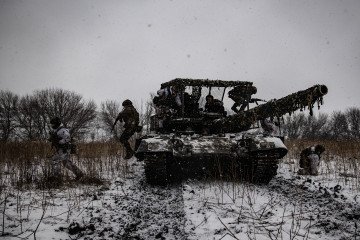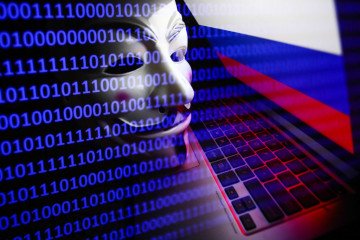- Category
- Latest news
UN Security Council Holds High-Level Briefing Ahead of 1,000 Days of Russia's Full-Scale War on Ukraine

Today, the United Nations Headquarters in New York hosted a session marking 1,000 days since Russia’s full-scale invasion of Ukraine. Organized by the UK during its presidency of the UN Security Council and initiated by Ukraine, the meeting addressed the ongoing war and its far-reaching global implications.
In their opening statements, Ukraine’s Minister for Foreign Affairs, Andrii Sybiha, emphasized the importance of Ukraine’s ability to strike military targets on Russian territory.
“The longer Ukraine can strike, the shorter the war will be. We have the full right to target military objectives on Russian territory to save civilian lives,” Sybiha stated, calling it a critical step in shifting the battlefield dynamics.
UK Foreign Secretary David Lammy highlighted the risks associated with long-range missile strikes, stressing operational security concerns. He also pointed to the deployment of 10,000 North Korean troops in Russia, describing it as “a major escalation linking the Indo-Pacific and Euro-Atlantic regions.”
Lammy reiterated the UK’s commitment to supporting Ukraine, saying, “We must stand with Ukraine and put it in the strongest possible position.
Following the opening remarks, representatives of member states at the UN Security Council delivered their statements, addressing the ongoing Russian war against Ukraine.
Follow us for live updates and highlights.
Republic of Korea
In the Republic of Korea’s statement at the UN Security Council, several details were shared regarding North Korea’s increasing role in the ongoing war in Ukraine, particularly its military support for Russia.
On North Korean troops
The Republic of Korea confirmed that North Korean troops have been deployed to Russia, marking the first time since the Korean War that North Korean forces are engaged in combat. “North Korean troops dispatched to Russia have completed their deployment to the battlefield near the Kursk oblast and are already engaged in combat operations. This is the first time since the Korean War that North Korea is engaged in actual combat with massive troops, about 11,000 soldiers.”
On arms shipments from North Korea
The Republic of Korea also pointed out that North Korea has provided significant military support to Russia in the form of munitions. “North Korea has shipped about 20,000 containers to Russia since August of last year, enough to carry 9.4 million artillery shells.” These shipments reflect the increased capacity of North Korea’s military factories, which are operating at full capacity to supply Russia with the materials it needs for the war.
On the Strategic Partnership Agreement
The deployment and military cooperation are backed by the “Comprehensive Strategic Partnership Treaty” signed between Russia and North Korea in June 2023. This agreement ended a 29-year hiatus since Russia renounced its 1961 Mutual Military Assistance Treaty with North Korea. While Russia has stated that this cooperation is not intended to concern third parties, the Republic of Korea emphasized that it affects not only the countries directly involved but also the broader regional security situation.
On North Korea’s military capacity
The Republic of Korea noted that North Korea’s military strength is considerable, with “well over 1 million” troops in total. North Korea operates as a highly militarized state, with mandatory service for men lasting 10 years and for women, 7 years. This large and well-trained military infrastructure could enable North Korea to increase its participation in the war, should it choose to do so.
On the covert nature of North Korean involvement
The involvement of North Korean soldiers in the war is being handled covertly, with reports that the DPRK is issuing “fake IDs” to soldiers and relocating their families to special sites in order to prevent the spread of information. “These soldiers are even being issued fake IDs to disguise themselves as Russians,” the statement noted, suggesting a move towards treating the deployment as more akin to mercenaries than a formal state military action.
On the potential gains for North Korea:
The Republic of Korea also speculated on what North Korea might gain from its support of Russia. While the exact terms are unclear, it is likely that North Korea is leveraging its position to obtain “fuel, energy, or high-end military technology for its nuclear and ballistic missile program.”
China
China’s statement at the UN Security Council emphasized peace and negotiations as the only path to resolving the Ukraine war, with a direct focus on the role of the United States.
On the role of the United States
China pointed out that the continuation of the war is “heavily influenced” by US actions. “The outbreak and continuation of the crisis in Ukraine has a lot to do with the United States. Whether there can be an early ceasefire and a political settlement will depend to a considerable extent on the attitude and actions of the United States.”
China firmly rejected any blame and responsibility regarding aiding Russia in its war against Ukraine. “The US representative once again slandered and smeared China, shifting the blame to China, which we firmly oppose.”
On global peace
China stated its efforts in leading the “Group of Friends of Peace” and called for the principles of no escalation and no provocation. “During the general debate of the General Assembly last September, China and Brazil, together with Algeria and other global South countries, held a ministerial meeting and initiated the establishment of the Group of Friends of Peace on the Ukraine crisis.”
On military means vs. negotiations
China reiterated that military action will not lead to lasting peace. “History has proven time and again that military means will not bring lasting peace, and that all conflicts will, in the final analysis, be resolved at the negotiating table.”
On China’s role
China reaffirmed its consistent stance of supporting dialogue and diplomatic efforts. “We have always been on the side of peace and on the side of dialogue. We have maintained communication and exchanges with Russia, Ukraine, and other relevant parties, actively carried out shuttle diplomacy, and spent no efforts in promoting peace through negotiations.”
Japan
Japan’s statement at the UN Security Council was a strong condemnation of Russia’s ongoing aggression against Ukraine, alongside a reaffirmation of Japan’s support for Ukraine and its sovereignty.
On Russia’s aggression and North Korea’s involvement
Japan emphasized the scale of Russia’s aggression, including its recent missile attacks, and strongly condemned Russia’s illegal actions. “We are appalled by the massive and widespread missile barrage on Ukraine over the past week, which caused the casualties of innocent civilians.” Japan called for Russia to immediately cease its aggression and withdraw from Ukraine, stressing that the country must respect Ukraine’s territorial integrity within its internationally recognized borders. The statement also condemned North Korea’s direct military involvement, highlighting that “North Korea’s soldiers have been dispatched to Russia and they are now engaged in combat against Ukraine.” Japan noted that this military cooperation between Russia and North Korea violates international law, including the UN Charter, and warned that it could have serious consequences for both European and Pacific peace and security.
On military cooperation with Iran
Japan also raised concerns about Russia’s military cooperation with Iran, calling it another threat to regional and global stability. “We also reiterate our deep concern about military cooperation between Iran and Russia. The international community must refrain from supporting Russia’s aggression directly or indirectly.”
On Ukraine’s sovereignty and the UN Charter
Japan firmly rejected any calls for peace that would undermine Ukraine’s sovereignty. “What is needed now is not a call for peace that ignores Ukraine’s sovereignty and territorial integrity, nor a demand for both sides to escalate in an equal manner which only rewards the aggressor.” Japan reiterated that the question at hand is whether to uphold or disregard the principles of the UN Charter, making it clear that Russia’s actions are a violation of these principles.
On Japan’s ongoing support for Ukraine
Japan emphasized its long-term commitment to supporting Ukraine’s recovery. “Japan is committed to and will continue its long-term efforts to rebuild the lives of the Ukrainian people and the entire country.” Japan has already provided over $12 billion in support for humanitarian assistance, recovery, and reconstruction efforts, including energy supplies and landmine removal.
On Japan’s position on the use of force
Japan concluded by reiterating its stance on the use of force in international relations. “Any unilateral attempt to change the status quo by force is unacceptable anywhere in the world. Japan stands firmly with Ukraine until peace and justice prevail.”
Russia
In his statement at the UN Security Council, Russia’s representative Vasily Nebenzya made a series of highly contentious and bizarre claims, particularly targeting the UK’s role in the war and accusing it of masterminding provocations and historical wrongs.
On Bucha accusations
Nebenzya’s claims about the Bucha incident took a strange turn, suggesting that the UK staged the atrocities to falsely accuse Russia. “To justify this shift to the Ukrainian public, British special forces and media participated in staging a cruel provocation in Bucha. After the Russian forces’ withdrawal, corpses were brought and arranged in the streets, yet the real cause of death was never explained to us, despite repeated requests.” The suggestion that the UK was behind this staged event is an unfounded accusation with no evidence presented.
On UK’s role in “prolonging the war”
Nebenzya continued his narrative by accusing the UK of persuading Ukraine to reject peace negotiations early in the war. He claimed that “Fifty days after the start of the special military operation, when the losses among the Ukrainian armed forces were still not significant, the hostilities had every chance of ending—if not for the interference of the British Prime Minister, who convinced Zelenskyy to continue fighting.”
On North Korean and British involvement
He further expanded his accusations to include both North Korea and the UK, claiming that the West’s support for Ukraine, particularly British mercenaries and weapons, was contributing to the war. “This is how we view not only the continued supply of weapons and intelligence to the Kyiv regime, but also the presence of British instructors and mercenaries—hundreds of them already eliminated—and the attempts to bring UAV, missile, and sea drone manufacturing specialists to Ukraine.”
On Russia’s goals in Ukraine
Nebenzya framed Russia’s war in Ukraine as a defensive action against what he described as neo-Nazi threats. “We are removing the neo-nationalist and neo-Nazi threat from our borders. No one has the right to intervene until the threats—such as the absorption of Ukraine into NATO, discrimination against Russian-speaking peoples, and the glorification of Hitler’s accomplices—are removed.”
Ukraine
Ukraine’s statement at the UN Security Council highlighted the devastating impact of Russia’s invasion, focusing on the toll it has taken on civilians, infrastructure, and the rule of law. The statement also emphasized the violations of international law and human rights, particularly Russia’s crimes against Ukrainian children and the use of prohibited weapons.
On crimes against Ukrainian children
Ukraine condemned Russia’s actions regarding Ukrainian children, calling the forced deportation and indoctrination of at least 20,000 children potentially “the largest state-run child kidnapping operation in history.” “The forcible deportation of at least 20,000 Ukrainian children might be the largest state-run children kidnapping operation in history. Thousands remain in Russia. They are subjected to indoctrination, forced Russian citizenship, adoption or forced displacement with Russian families, and even name changes.”
On the role of the international community
Ukraine called for stronger international action, even if it means setting a precedent to ensure accountability for Russia’s crimes. “If this requires setting a precedent, let’s set a precedent. If this requires amending the Rome Statute, let’s amend it. We must act to restore international peace and security.”
On Russia’s alliance with rogue states
Ukraine condemned Russia’s alliances with North Korea and Iran, warning that these partnerships will have global consequences. “The involvement of regular North Korean troops marks a new level of escalation and global proliferation of war. North Korean ballistic missiles, like the KN-23, have struck Ukraine and could cause devastation far beyond its borders.”
On Russia’s colonial goals
Ukraine also highlighted the economic motivations behind Russia’s invasion, pointing to the exploitation of Ukraine’s natural resources. “For Russia, this is also a war for natural resources. They try to capture Ukraine’s rich deposits of manganese, uranium, titanium, and other resources—a very colonial approach.”
United States
The United States’ statement at the UN Security Council was a direct condemnation of Russia’s brutal invasion of Ukraine and its violations of international law. It also focused on the desperate measures Russia has taken, including its alliances with rogue states like North Korea and Iran. A particular emphasis was placed on the role of China in enabling Russia’s aggression.
On Russia’s disregard for human life
The US called out Russia’s total disregard for human life, pointing to the thousands of Ukrainian civilians killed and displaced by the invasion. “Russia has committed some 147,000 war crimes, and every night Ukrainian families live in fear of Russian aerial strikes which continue to pound the country.” The US also noted the hypocrisy of Russia’s statements on humanitarian issues, contrasting their actions with their rhetoric. “You saw Russia just this morning veto a resolution on Sudan that would have facilitated humanitarian assistance…you heard them declare their support for the Palestinian people, but you know, this is just hypocrisy at its best and lies at its worst.”
On Russia’s alliances
The US stressed that Russia’s desperation has led to alliances with rogue states like North Korea and Iran. “In its desperation, the Kremlin has turned to the DPRK first for arms and now for manpower. At least 10,000 soldiers have been sent to engage in combat operations with Russian forces.” The statement highlighted the historical precedent of Russia welcoming foreign troops and noted that it violates multiple UN Security Council resolutions. “Not in over a hundred years has Russia welcomed foreign troops onto its soil. This is a blatant violation of UN Security Council Resolutions 1718, 1874, and 2270.”
On China’s role in enabling Russia’s aggression
The US also directly called out China for enabling Russia’s war effort, particularly by providing dual-use goods and parroting Russian talking points to justify the war. “I again call on another permanent member of this council, China, to stop stoking war on the European continent, to end enabling Russia’s war effort, to cease providing dual-use goods to Russia, and to quit parroting Russia’s talking points to justify this war.” The US made it clear that there can be no justification for Russia’s invasion of Ukraine and called on China to stop supporting Russia’s aggression.
On the need for a just and lasting peace
The US reiterated that any peace that is not just or sustainable is not a true peace. “A peace that is not just is not peace. A peace that is not sustainable is not peace. And a peace that is not Ukraine-led is not a true peace.” The US called on all UN member states to support Ukraine’s formula for peace, one that fully respects Ukraine’s sovereignty and territorial integrity and holds Russia accountable for its crimes.
On continued US support for Ukraine
The US reaffirmed its commitment to providing security assistance to Ukraine, including artillery, air defense, and armored vehicles. “The United States will continue to surge security assistance to Ukraine, including artillery, air defense, armored vehicles, and other needed capabilities and munitions.” The statement emphasized that supporting Ukraine in its fight against Russian aggression must not be a partisan issue. “Supporting Ukraine in Congress and beyond it cannot be and should not be a partisan issue.”






-72b63a4e0c8c475ad81fe3eed3f63729.jpeg)

